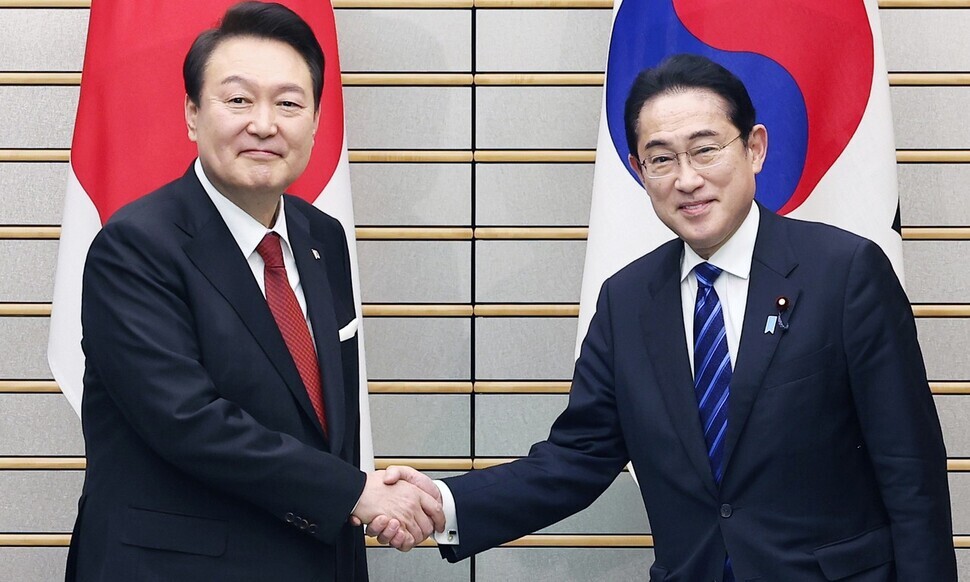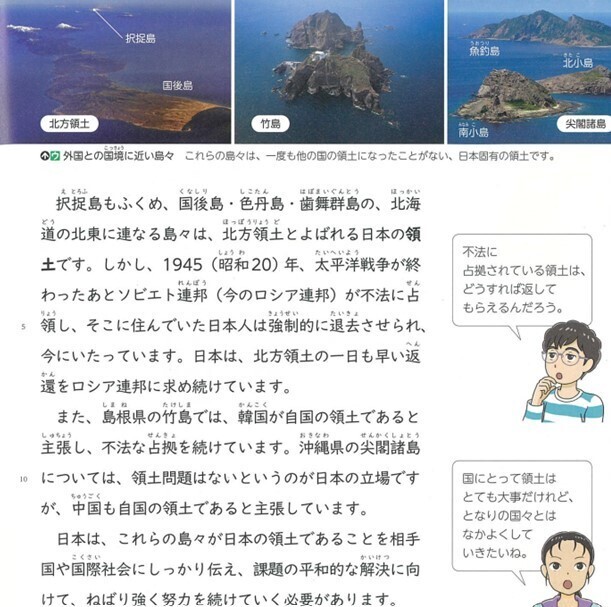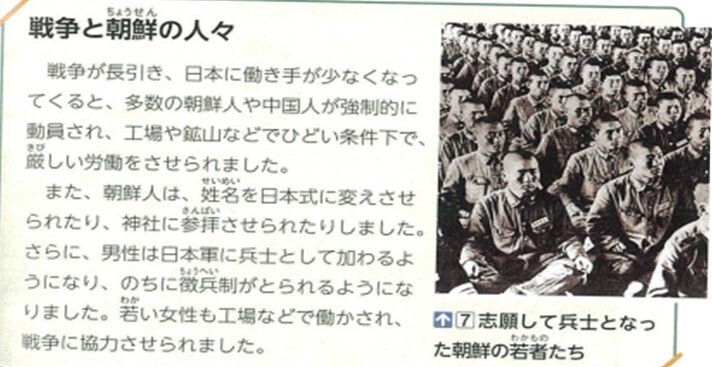hankyoreh
Links to other country sites 다른 나라 사이트 링크
Japan lays claim to Dokdo, whitewashes forced mobilization in new textbooks

Starting next year, social studies textbooks for sixth graders in Japan will contain flimsier descriptions of the coercive nature of forced mobilization, such as the conscription of Koreans. Textbooks for elementary students will include more detailed descriptions of the unjustified claim that Dokdo is “Japanese territory” that is “being illegally occupied by South Korea.”
Contrary to the Yoon administration’s hopes of a gesture of good faith from Japan on historical issues between South Korea and Japan, Japan is becoming ever more brazen in its desire to forget its history of colonization and aggression.
Japan’s Ministry of Education, Culture, Sports, Science and Technology announced on Tuesday the results of a review of elementary school textbooks, including social studies, to be used starting in 2024. According to an analysis by the Asia Peace & History Education Network, all three types of sixth-grade social studies textbooks that passed the examination were found to be more backward in their treatment of forced labor mobilization victims than the books that passed the review in 2019.
In their 2019 textbook that passed the review, educational publisher Tokyo Shoseki wrote “Korean youths who became soldiers” to explain a photograph in a section about “War and Koreans,” but in the current version they have changed the sentence to “volunteering Korean youths who became soldiers.” Japan introduced the army volunteer system in Korea in 1938, and conscription began in 1944. While the exact date the photo was taken is uncertain, we can read the Japanese government’s intention to emphasize the “voluntary” nature of the Koreans to deny Japan’s responsibility for forcing them to fight in the war.

The text within the textbook was also revised from “men were conscripted as soldiers in the Japanese army” to “men participated as soldiers in the Japanese army, and a conscription system was implemented at a later time.”
In a passage related to victims of forced mobilization, a key issue between South Korea and Japan, the phrase “many Koreans and Chinese were forcibly taken” has been changed to “forcibly mobilized.” It is believed that the “forcibly taken” part has been adjusted after the Japanese government banned the use of the phrase “forcibly transported” and “forcibly taken” through a Cabinet meeting in 2021. In the textbooks published by Kyoiku Shuppan, only the word “conscripted” was removed from the phrase “conscripted as soldiers to the Japanese army and sent to the front.”
The overall description of the forced mobilization of Koreans is also lacking. All three social studies textbooks for grade six included sections on the subject, but all of them are very short, at only two or three sentences. Descriptions of the massacre of Koreans immediately following the Great Kanto Earthquake on Sept. 1, 1923, — the centennial of which is this year — also disappeared. The Nihon Bunkyo-authored textbook had previously mentioned that “false rumors were spread, and many Koreans were killed,” but that sentence has disappeared entirely in the 2024 edition.

On the other hand, Japan’s unjustified territorial claim that Dokdo — “Takeshima” as it is called there — “is Japanese land” was included in all elementary school textbooks in even greater detail. All social studies and geography textbooks for grades 3-6 included Japan’s unjustified claims to the islets, and all the publishers apart from Nihon Bunkyo added that “South Korea is illegally occupying the islets,” and that the “Japanese government is protesting” to resolve the situation.
The inclusion of Dokdo in Japanese elementary school textbooks used to be limited to one publisher, but has been expanded to all textbooks since 2014, following President Lee Myung-bak’s visit to Dokdo in August 2012.
In a press conference on Tuesday, the Asia Peace & History Education Network stated its concern that “the Japanese government’s policy of denying history is directly affecting elementary school textbooks,” adding that “failure to teach the painful history of Japan’s aggression and illegal domination of its neighbors will prevent future Japanese citizens from coexisting peacefully with other Asians.”
South Korean First Vice Foreign Minister Cho Hyun-dong summoned Naoki Kumagai, deputy chief at the Japanese Embassy in South Korea, to the Ministry of Foreign Affairs building in Seoul, to lodge a protest over the textbooks.
By Kim So-youn, Tokyo correspondent; Jung In-hwan, staff reporter
Please direct questions or comments to [english@hani.co.kr]

Editorial・opinion
![[Editorial] Penalties for airing allegations against Korea’s first lady endanger free press [Editorial] Penalties for airing allegations against Korea’s first lady endanger free press](https://flexible.img.hani.co.kr/flexible/normal/500/300/imgdb/original/2024/0502/1817146398095106.jpg) [Editorial] Penalties for airing allegations against Korea’s first lady endanger free press
[Editorial] Penalties for airing allegations against Korea’s first lady endanger free press![[Editorial] Yoon must halt procurement of SM-3 interceptor missiles [Editorial] Yoon must halt procurement of SM-3 interceptor missiles](https://flexible.img.hani.co.kr/flexible/normal/500/300/imgdb/child/2024/0501/17145495551605_1717145495195344.jpg) [Editorial] Yoon must halt procurement of SM-3 interceptor missiles
[Editorial] Yoon must halt procurement of SM-3 interceptor missiles- [Guest essay] Maybe Korea’s rapid population decline is an opportunity, not a crisis
- [Column] Can Yoon steer diplomacy with Russia, China back on track?
- [Column] Season 2 of special prosecutor probe may be coming to Korea soon
- [Column] Park Geun-hye déjà vu in Yoon Suk-yeol
- [Editorial] New weight of N. Korea’s nuclear threats makes dialogue all the more urgent
- [Guest essay] The real reason Korea’s new right wants to dub Rhee a founding father
- [Column] ‘Choson’: Is it time we start referring to N. Korea in its own terms?
- [Editorial] Japan’s rewriting of history with Korea has gone too far
Most viewed articles
- 160% of young Koreans see no need to have kids after marriage
- 2Months and months of overdue wages are pushing migrant workers in Korea into debt
- 3[Editorial] Penalties for airing allegations against Korea’s first lady endanger free press
- 4Historic court ruling recognizes Korean state culpability for massacre in Vietnam
- 5Presidential office warns of veto in response to opposition passing special counsel probe act
- 6[Reporter’s notebook] In Min’s world, she’s the artist — and NewJeans is her art
- 7Bills for Itaewon crush inquiry, special counsel probe into Marine’s death pass National Assembly
- 8In rejecting statute of limitations defense in massacre case, Korean court faces up to Vietnam War a
- 9[Guest essay] How Korea must answer for its crimes in Vietnam
- 10Story of massacre victim’s court victory could open minds of Vietnamese to Korea, says documentarian